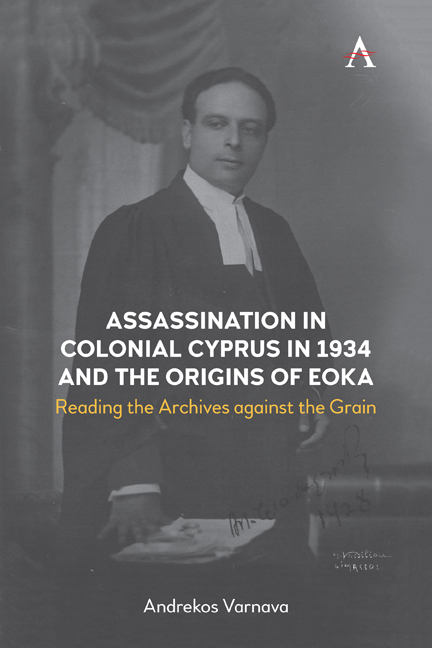 Assassination in Colonial Cyprus in 1934 and the Origins of EOKA
Assassination in Colonial Cyprus in 1934 and the Origins of EOKA Book contents
- Frontmatter
- Dedication
- Contents
- List of Figures
- Acknowledgements
- List of Abbreviations
- Note on Translations
- Introduction
- 1 Triantafyllides before his Assassination
- 2 The Colonial Newspaper Archive and the Triantafyllides Case
- 3 The Colonial Government Archive and the Triantafyllides Case
- 4 The Assassination of Triantafyllides and the EOKA Connection
- Conclusion
- Select Bibliography
- Index
2 - The Colonial Newspaper Archive and the Triantafyllides Case
Published online by Cambridge University Press: 22 February 2022
- Frontmatter
- Dedication
- Contents
- List of Figures
- Acknowledgements
- List of Abbreviations
- Note on Translations
- Introduction
- 1 Triantafyllides before his Assassination
- 2 The Colonial Newspaper Archive and the Triantafyllides Case
- 3 The Colonial Government Archive and the Triantafyllides Case
- 4 The Assassination of Triantafyllides and the EOKA Connection
- Conclusion
- Select Bibliography
- Index
Summary
Even if this long-suffering Island has known many wounds, not less than three months have passed and two wounds have been opened in its bowels.
Πρωινή (Morning), 18 January 1934, 1.During the night of 12 January, many of the newspaper editors in Nicosia were in deep shock as news of the shooting of Antonios Triantafyllides spread. The editor of Πρωινή was at the hospital, where Dr Themistocles Dervis, the Mayor of Nicosia (1929–46 and 1949–59), stated that ‘his situation was critical’. As the editors went to press, they could only report on his shooting, and had no idea that their next print would be reporting his death, which caused much heartache and loss for his family, friends, colleagues and the public, as evidenced by the numerous published memorials, for example the epigram, which places the assassination of Triantafyllides on the same level of importance as that of Kyrillos III.
This chapter explores the colonial newspapers which cover two periods of the Triantafyllides case. The first with articles on the shooting, his death and the funeral and memorial services. These provide the reactions (generally of shock and sadness) from the newspaper editors, the public and his friends and colleagues. The articles also establish a timeline of the before and after the shooting, until his death, with numerous important facts revealed that were not covered in the subsequent trial. These articles are vital for analysing the second series of articles, on the pre-hearing and criminal court case against Stavros Christodoulou, which took place a year after the assassination. Without the court records or a comprehensive account of the court proceedings in the government files, the newspapers proved essential for establishing many facts in connection with the shooting, death, funeral and memorials, and the subsequent court case, especially the case of the prosecution and the testimonies of witnesses.
The chapter has two broad aims. Methodologically it aims to show that a community of records can only be created when all the sources are consulted, and in this case the newspapers proved pivotal to exploring the case because they provided information and detail otherwise unavailable.
- Type
- Chapter
- Information
- Assassination in Colonial Cyprus in 1934 and the Origins of EOKAReading the Archives against the Grain, pp. 47 - 60Publisher: Anthem PressPrint publication year: 2021


